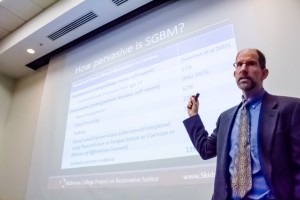Sexual violence experts train local workforce for sixth year
Tyler McNeil
Managing Editor
Professionals in fields from healthcare to law enforcement entered the BTC last week to fight sexual violence.
“Luckily, we’ve been having this conference every year, and we’ll continue to sponsor it because we all need to stay on top of this information,” said Public Safety director Fred Aliberti.
Public Safety co-sponsored the sixth annual Rensselaer County Sexual Assault Response Team (SART) conference “Joining Forces”. “Unfortunately, none of it really surprises me,” said Lindsey Crusan, SART coordinator, about professionals having to attend the event to work with sexual offense victims in their fields.
Crusan mentioned local colleges such as RPI and Siena have attended “Joining Forces” years before new campus sexual assault legislation went into effect. “It’s nice to know that we’ve been ahead of that, and it’s nice to know they’re still coming,” she said.
Skidmore College professor David Karp discussed continuing to reform the way colleges handle campus sexual offenses in the first workshop of the session. He believes that college sanctions, such as expulsion, fail to resolve conflict between victims and perpetrators. “If a place like Skidmore expels a student, it makes Skidmore a little safer, but that student could then just go to Hudson Valley because it’s an open access institution where it’s much harder to deny admission,” said Karp.
He mentioned the benefits of colleges approaching sexual offenses through restorative justice, a system that focuses around resolving conflicts in small groups to satisfy the needs of victims and offenders. “It’s thinking about how can we make things better for everyone involved,” he said. The system is modeled around circles of support and accountability (CoSA), intended to increase satisfaction with the justice system and reduce post-traumatic stress disorder symptoms for victims.
CoSA projects currently exist throughout Canada, parts of the United Kingdom and over seven states. “I see [restorative justice as] more difficult to implement in a small school rather than a big institution,” said Michelle Day, clinician at Union College.
After Karp discussed problems on college campuses, the second workshop session centered around promoting education to males against gender-based violence. “We’re setting up our young men to fail in many ways,” said Christin Guilder, assistant director at the UAlbany advocacy center for sexual violence, about schools failing to teach students to avoid developing misogynistic behavior at an early age.
After retiring from the Cohoes Police Department, Michael Fonda teaches classes to eliminate rape culture at Hudson Valley and local high schools. According to Fonda, the Mentors in Violence Prevention (MVP), which was originally created for athletes, has had positive results reaching as far as the Rensselaer County correctional facility. “One inmate told me that he called up his first girlfriend and apologized to her,” he said.
Panelists and audience members mentioned a lack of training within law enforcement for handling sex crimes. “There’s such a human element in this, and that’s why you see police sometimes handle these [cases] in a way that doesn’t make sense,” said John Cooney, prevention educator for the sexual assault and crime victims assistance program at Samaritan Hospital.
In her experience working with sex crimes as former police officer, Rensselaer County detective Terri Hansen recalled officers struggling to handle male victim cases more than female victim cases. “I don’t see a lot of empathy sometimes because it becomes not about the victim, it becomes about the officer themselves. They’re uncomfortable,” said Hansen.
Kaylin Dawson, sexual assault nurse coordinator at Albany Medical Center, said her first victim this year, a male, was interviewed by police while he sat in the waiting room. “I said ‘Unfortunately, you probably were already stereotyped because no female we know is going to be interviewed in a waiting room’,” she said.
Along with exploring flaws within law enforcement, new advantages used by police to tackle sex crimes online were mentioned earlier in the conference during the plenary session “Computer Crimes 2016.” “Every time you do a tweet or post a photo on Instagram, somebody’s grabbing that data,” said Lieutenant Mark Brown, director of the New York State Police Computer Forensic Lab.
Brown mentioned tracking criminals through searching geocode coordinates on Twitter and receiving voicemails after dialing a number without making a call. On enterprise.com, Brown was able to track vehicle information without a subpoena. “It’s important that while perpetrators are staying up on advances in technology, those of us who respond are up to date as well,” said Crusan.

